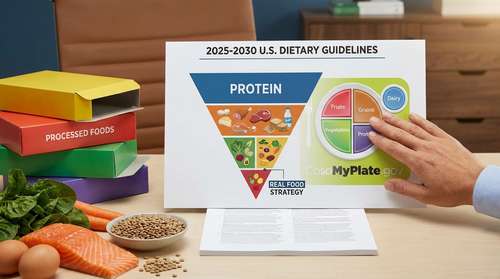Healthy table salt alternative to reduce heart attack, stroke, and death risks
By
Josh Piers

If setting the table with salt and pepper shakers is part of your nightly dinner routine, you might want to think about this study.
A simple transition from conventional table salt to a reduced-sodium, added-potassium "salt substitute" drastically lowered incidence of stroke, heart attack, and death in one of the largest dietary intervention studies ever done.
The study was published in the New England Journal of Medicine and was headed by researchers from Sydney's George Institute for Global Health.
"I believe this study offers something for everyone in the world," says Bruce Neal, executive director of the George Institute and study co-author.
"Salt is consumed by practically everyone on the planet, and almost everyone consumes more salt than they should."
"Every year, several million premature deaths may be avoided if salt were replaced by salt substitutes over the world."
So, what exactly is the issue with salt?
Adults should consume around one teaspoon of salt each day, which is equal to 2,000 milligrams of sodium. High salt consumption has been linked to hypertension, renal damage, strokes, and heart attacks.
By increasing tissue damage through oxidative stress and inflammation, it may potentially increase the chance of Alzheimer's disease and autoimmune disorders like multiple sclerosis and rheumatoid arthritis.
Tom Marwick, director of the Baker Heart and Diabetes Institute, believes there is "no doubt" that excessive salt consumption is linked to cardiovascular disease.
He stated, "We know that salt is a primary driver of disease. Reducing communal salt intake has been a long-term challenge."
Professor Neal refers to "discretionary salt" as salt used for flavor when cooking and eating, as well as salt used to preserve foods.
The salt substitute he and his colleagues produced was made up of 75% sodium chloride (so conventional salt) and 25% potassium chloride.
"The sodium in salt is the nasty part," Professor Neal explained.
"So we chose this particular combination, the 25/75 mix, in part because we knew it helped lower blood pressure, but we also knew it tasted like conventional salt."
When the salt was switched, what happened?
21,000 adults from 600 rural communities in five provinces across China were recruited for the study between April 2014 and January 2015.
All of the participants had a history of stroke or had blood pressure that was poorly controlled.
Professor Neal explained, "We went to rural China because it's pretty straightforward to replace salt in a rural Chinese diet."
"We gave half of the patients a salt alternative and the other half remained to consume 100% sodium chloride, so simply conventional salt," says the researcher.
The participants in the study were tracked for five years.
Each group's strokes, heart attacks, and deaths were tracked and compared.
Professor Neal said, "We wanted to try and address the question once and for all: could we minimize clinical occurrences if we reduced the amount of [table] salt that people ate?"
Researchers discovered that those who used the salt substitute had a 14 percent lower risk of stroke, a 13 percent lower risk of total cardiovascular events (strokes and heart attacks combined), and a 12 percent lower risk of premature mortality.
Professor Neal remarked that the salt substitute group had lower blood pressure than the table salt group.
"It's not that different from what you get with a medicine, and the results [on lowering cardiovascular events and death] are probably not that different either."
While the study was "a really big achievement," Professor Marwick noted that it was undertaken on a high-risk population.
"Stroke is a specific problem in China," he said, "but [the researchers] have demonstrated a benefit."
Is it safe to use salt substitutes?
Because potassium is included in salt replacements, they may not be suited for everyone.
Hyperkalemia, or excessive potassium levels in the blood, can cause cardiac arrhythmias and abrupt death, according to Professor Neal, especially in those with chronic kidney disease.
As a result, patients with major kidney problems and those taking potassium-raising medications were excluded from the study.
Professor Neal remarked, "We saw no indication of any increased risk of events caused by hyperkalemia, and we saw no evidence of any increased risk of sudden death."
While salt substitutes are a "relatively inexpensive" modification to make, they are nevertheless more expensive than salt — roughly $2.20 per kilogram in China against $1.48 per kilogram in the United States.
Professor Neal expressed concern that the price disparity would discourage individuals from choosing salt replacements.
"If we're going to obtain the benefits, I think we're going to have to consider subsidizing the cost of salt substitutes to the cost of ordinary salt in lower-income situations," he added.
Salt substitution, according to Professor Marwick, is "a big step, but not the only solution to a community-wide problem with salt."
Changes in the food environment's policies are also required.
Professor Neal said, "Certainly attempting to persuade the food industry to add less sodium and to keep more of the potassium that is generally in the products before they get processed in final food items is something we want to achieve."
What's Your Reaction?
Share this article
Author
Related Posts

FDA’s 2026 Nutrition Overhaul: Dye Bans & New Labels Transform Grocery Aisles

Fish Oil Paradox: New Study Reveal Omega-3s May Fuel Cancer in Some Patients

Historic Reset: New 2025-2030 U.S. Dietary Guidelines Upend Decades of 'MyPlate' Advice
